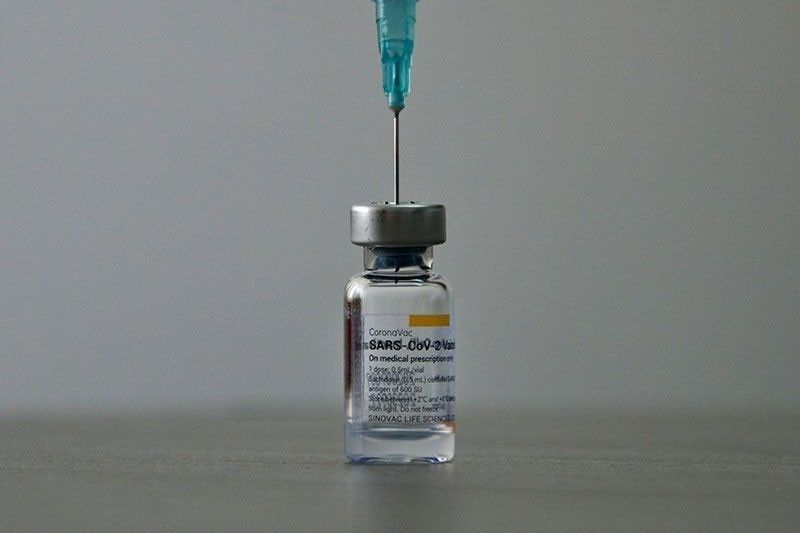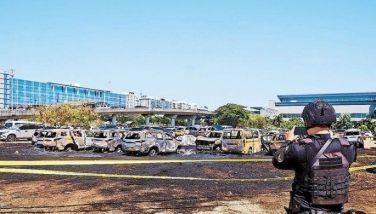No stopping vaccine rollout; Palace backs Sinovac for seniors

MANILA, Philippines — The government’s immunization program against COVID-19 will continue despite the death of a healthcare worker following vaccination, the Department of Health (DOH) made clear yesterday.
Beverly Lorraine Ho, DOH Disease Prevention and Control Bureau director, said there is no reason for the government to suspend the vaccine rollout, considering that authorities have not found a link between the immunization and death of the HCW.
“Causality assessment has determined that there is no correlation between the vaccine and this event and therefore our national deployment of COVID vaccine shall continue. While we regret the occurrence of this event, we also wish to reiterate and emphasize that all vaccine the FDA approved and rolled out in the country remain safe and effective instrument in helping prevent severe case of COVID infection,” Ho said at a virtual briefing yesterday.
The government, she added, is also not making any change in the existing vaccination protocol since other countries do not conduct a test prior to vaccination as part of screening.
Malacañang, meanwhile, said it’s in favor of vaccinating the elderly using vaccines developed by China’s Sinovac, despite FDA warning regarding the lack of a concrete study on the vaccines’ efficacy on individuals 60 year old and above.
“We are very supportive since there are many countries around the world which use Sinovac for their senior citizens. And I think steps will be taken to ask the local representative of Sinovac to present additional data to the FDA,” presidential spokesman Harry Roque said.
Rommel Lobo, National Adverse Events Following Immunization (NAEFI) vice-chairman, said the death of the 47-year old HCW was unrelated to the vaccination.
“From the clinic paper we reviewed, the investigation and the evaluation, it clearly pointed to a death secondary to coronavirus infection and not (to the) vaccine that the patient had,” he pointed out.
Investigation showed that the HCW initially tested positive for COVID last Feb 22, but turned negative when tested the following day. On the day she was vaccinated with Sinovac, she declared no symptoms of the infection during screening.
Lobo said that although the HCW tested positive, she was still vaccinated because it was concluded that the virus detected might have been remnants of the COVID infection she had acquired.
On March 8 or four days after vaccination, the HCW again tested positive for COVID but refused hospital admission. Although she was hospitalized days later, she succumbed to the infection on March 13.
“Vaccine does not cause, as we all know, COVID-19 because it’s an inactivated vaccine and none of the vaccines used in the Philippines can make people sick with COVID 19,” Lobo stressed.
Exposed to asymptomatic
Noting the surge in COVID cases, he opined that the HCW may have been exposed to an infected but asymptomatic individual and that this exposure is most likely responsible for the symptoms the patient manifested before death.
Lobo said the vaccine could not immediately provide protection because it takes time for the body to develop antibodies.
FDA director-general Eric Domingo explained that during the first weeks after injection with the vaccine, a person still has no protection because this is the time the immune system is trying to develop.
“So (it is really) expected that during the first few weeks of vaccination, (the) risk of getting infected and getting severe illness (is) probably the same as (that of) a non-vaccinated person. We reported (to the vaccine manufacturer) the death of a patient who received Sinovac and later developed COVID. We ask them for information of any similar events that have happened in other countries,” Domingo said, adding that the FDA is still waiting for response from Sinovac.
He also said that it is not clear if the HCW could qualify for the indemnity fund.
The FDA already recorded 7,469 suspected cases of adverse reaction following immunization (AEFI), a majority of which are mild. Of the total AEFI, only 137 were reported as serious.
Domingo said the AEFI rate of 2.2 percent with Sinovac and 5.19 percent with Astra Zeneca are “expected” and that all AEFI cases have been reported to the NAEFI committee for assessment. Those who reported serious adverse reaction and hospitalized were sent home after the resolution of the symptoms.
He also noted that the FDA had a meeting with Astra Zeneca concerning the reported cases of blood clotting among those who receive the vaccine in Europe.
“The findings really is that the blood-clotting event is similar to what will happen in a normal population without a vaccine, or even in a population that are vaccinated even with other brands,” Domingo disclosed.
On track
As this developed, Roque got help from a health expert in debunking statement of former health secretary Esperanza Cabral that the country is now “10 steps back from square one” with over 61,000 active COVID-19 cases, or the same level as in July 2020.
Dr. Edsel Salvana, the director of the Institute of Molecular Biology and Biotechnology at the UP National Institute of Health, said the Philippines has gone a long way in addressing the health crisis since last year’s outbreak of the pandemic.
“I also love Secretary Cabral and she is very close to me po. In this case, we probably have a professional difference in this manner because as I have already mentioned in many of my posts, we know much better how to take care of COVID-19,” Salvana told Roque.
In his medical practice, Salvana noted the healthcare system can now address the symptoms of the disease and avoid deaths.
“I haven’t had the death since January among my patients, and I have had very sick patients, including doctors, in the ICU. So I think that from a completely medical standpoint, we are in a better position, mas marami po tayong gamot – we have dexamethasone; we have Remdesivir; we have tocilizumab as well,” Salvana said.
The DOH’s One Hospital Command has been formed to address hospitalization needs of COVID-19 patient, the doctor added.
“Our problem right now is we need to make sure that patients who need to be in the hospital do have hospital beds. The truth is, if these are all mild cases, it’s not going to increase our death rate,” Salvana said.
Salvana, however, admitted there is a need to address the rising number of hospital confinements for mild cases. “About 50 percent of the mild cases are also admitted in the hospitals which pushes out some of the beds that can be used for severe,” he said.
“We can reserve the hospital beds for the severe cases. Because the severe cases, they are prone to dying, if we don’t have hospital beds for them. And like I said, we already know how to take care of severe COVID,” Salvana said.
Vaccine supply
Meanwhile, a supply deal for Johnson & Johnson’s vaccine, which requires only one dose, will most likely be signed next week, vaccine czar Carlito Galvez Jr. said.
“We are preparing the supply agreement (and) most likely, this coming week, we could probably have signed it,” he told ANC yesterday.
The World Health Organization listed the one-shot Janssen COVID-19 vaccine last week in its index of safe and effective emergency tools, allowing for its emergency use in all countries. This makes the vaccine the first listed single-dose regimen by the WHO.
Galvez said the listing also meant that the Philippines could receive Johnson & Johnson shots from the Covax Alliance, which had delivered more than 500,000 AstraZeneca doses this month. It is expected to deliver Pfizer vaccines in the second quarter of the year.
“What’s good about this is this has an EUL (emergency use listing) from the WHO. So, it could be included in the Covax (supplies the country may receive),” he pointed out.
The expected continuous delivery of vaccines to the country seemed to have taken a pause after the arrival of AstraZeneca and Sinovac doses early this month.
But Galvez assured the public of efforts to secure a “steady supply” of COVID-19 vaccines for a better celebration of Christmas this year.
With the first quarter coming to an end in less than two weeks, Galvez said about one million Filipinos would be vaccinated weekly beginning April 2. The count would gradually increase beginning May and is expected to eventually reach three to five million weekly starting June.
“Our declaration is: we’ll have a better Christmas this coming year. That’s our target. We will inoculate 70 million and we saw that we can do this if we can have a steady supply,” he added.
The Philippines is eyeing an early shipment of 200,000 to 500,000 Novavax vaccines this coming quarter once the US Food and Drug Administration and the country’s own regulators grant its emergency approval. Following talks with the US drugmaker, Galvez earlier said the country was able to secure 30 million doses of Novavax.
About five to 10 million doses of Russia’s Sputnik V would also be procured once it gets approved for emergency use.
Foreign Affairs Secretary Teodoro Locsin Jr. described Sputnik V as the “best” vaccine, noting that it has already contributed to the significant decline in COVID cases.
Calling Sputnik V the only “peer reviewed” vaccine published in The Lancet, Locsin said he would turn every stone to secure doses of it.
The country has so far approved COVID-19 vaccines of Pfizer, AstraZeneca and Sinovac for emergency use and has so far inoculated 269,583 healthcare workers.
Meanwhile, as the country continues to vaccinate health workers, the government has set its sights on vaccinating elderly Filipinos next month despite the Philippine FDA’s recommendation against it.
“Because we saw that Sinovac has very limited side effects and at the same time, there’s not much wastage of the shots,” Galvez said at the Kapihan sa Manila Bay virtual news forum on Wednesday.
The FDA recommends the use of Sinovac shots for healthy individuals aged 18 to 59.
The government is eyeing to acquire 148 million doses to inoculate 70 million adult Filipinos to achieve herd immunity.
Citing a National Task Force against COVID-19 data, Sen. Risa Hontiveros urged the government to commit to a deadline to finish the vaccination of all HCWs. The NTF said only 12.7 percent of the 1.7 million health workers have so far been vaccinated. — Christina Mendez, Neil Jayson Servallos, Pia Lee-Brago,
- Latest
- Trending





























